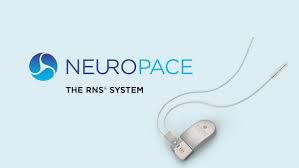MOUNTAIN VIEW, Calif.– NeuroPace, Inc. (Nasdaq: NPCE), a commercial stage medical device company focused on transforming the lives of people living with epilepsy, today announced the first patient implanted in the NAUTILUS clinical study. The pivotal study will evaluate the safety and effectiveness of the RNS® System in individuals aged 12 and older with drug-resistant idiopathic generalized epilepsy (IGE), also known as primary generalized epilepsy.
The first procedure took place at Vanderbilt Health in Nashville, Tenn. with co-investigators Angela Crudele, MD, and Dario Englot, MD, PhD. “Today, we have limited treatment options for patients who have drug-resistant, idiopathic generalized epilepsy,” said Dr. Crudele. “This condition can be very difficult to treat and has a significant impact on a patient’s and family’s quality of life. I am excited about the possibility of having an FDA-approved treatment for this population, such as a brain-responsive neuromodulation, and giving these patients a better future.”
Idiopathic Generalized Epilepsy (IGE) is the second most common type of epilepsy, after focal onset epilepsy1. IGE accounts for between 15 to 30% of epilepsies2, is usually diagnosed in childhood or adolescence, and often results in life-long seizures. Patients with IGE frequently have seizures that cause loss of consciousness and commonly experience injuries from seizure-related falls. Further consequences from uncontrolled seizures include poor cognitive outcomes, depression, decreased social interaction with peers, increased seizure frequency, and sudden unexplained death in epilepsy (SUDEP).
Bonnie, who has had drug-resistant epilepsy since infancy, was the first patient treated in the NAUTILUS study. She said, “I missed a lot of school when I was younger from my epilepsy. I was held back and unable to drive. My family is always worried about me and concerned I might have a seizure. My greatest hope for the trial is to be stable enough to have a job.”
“This is a groundbreaking study that could allow individuals who have drug-resistant generalized epilepsy to be treated with the RNS System. Brain-responsive neuromodulation is a proven therapy for drug-resistant focal epilepsy, with long-term studies demonstrating significant seizure reduction and quality of life improvements for patients,” said Martha Morrell, MD, Chief Medical Officer of NeuroPace. “I look forward to investigating whether this therapy could provide similar benefits to patients suffering from primary generalized epilepsy, helping to fill a large unmet need in this population.”
The RNS System is the only FDA-approved brain-responsive neuromodulation system that delivers personalized, targeted treatment at the seizure source. Unlike other neuromodulation devices, the RNS System is a closed-loop technology that monitors and responds to a patient’s unique brain patterns to deliver therapy in real-time, typically before clinical symptoms occur.
The NAUTILUS Study is a prospective, multicenter, randomized, controlled pivotal study designed to demonstrate that the RNS System is safe and effective as an adjunctive therapy for primary generalized seizures in individuals aged 12 and older who have drug-resistant IGE.
In 2021, the company received Breakthrough Device Designation status from the FDA for the potential use of its RNS System to treat idiopathic generalized epilepsy. The Breakthrough Devices Program aims to speed development and assessment of devices that have the potential to provide more effective treatment or diagnosis for life-threatening or irreversibly debilitating conditions.



